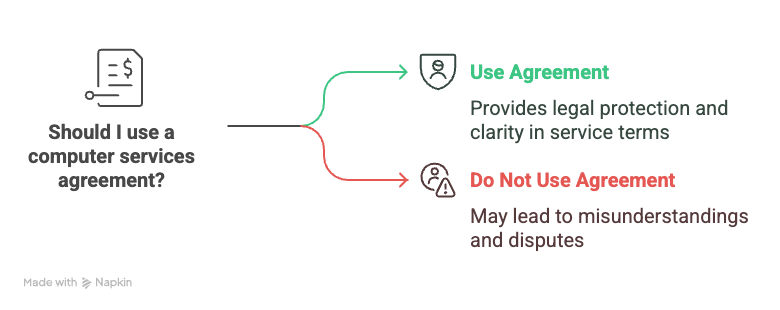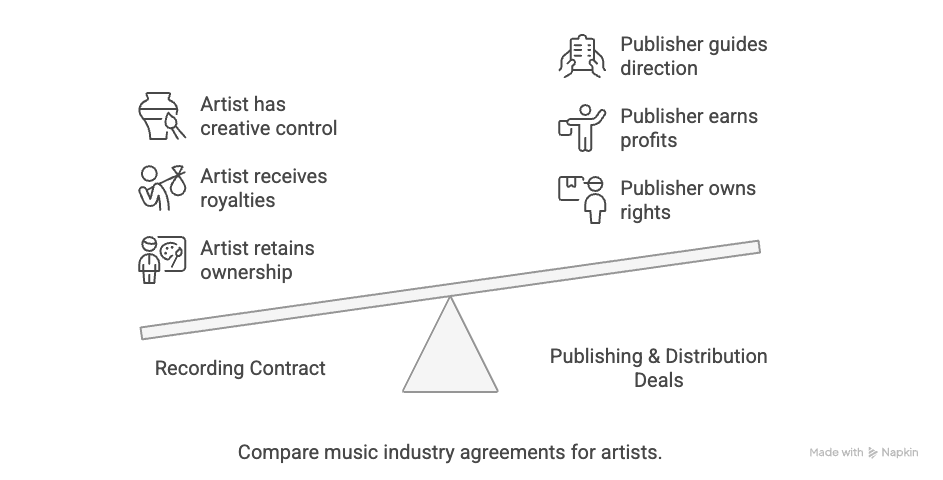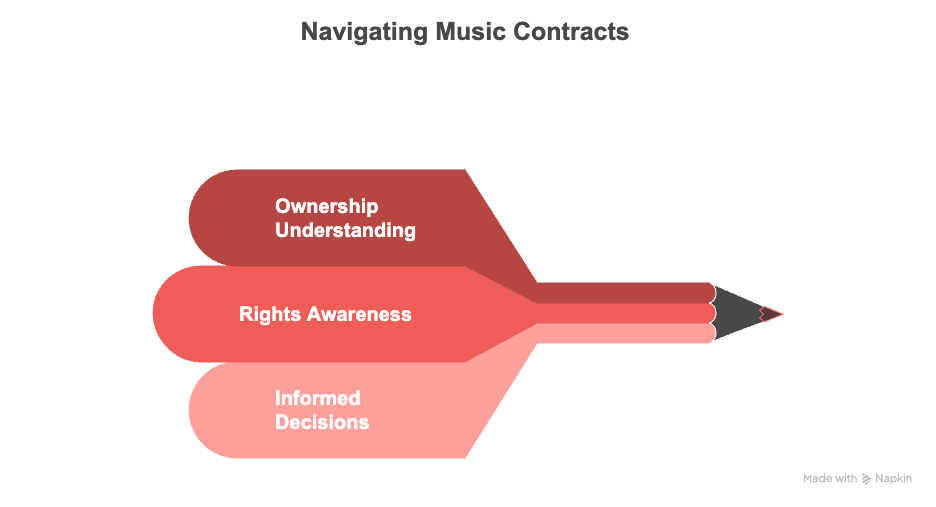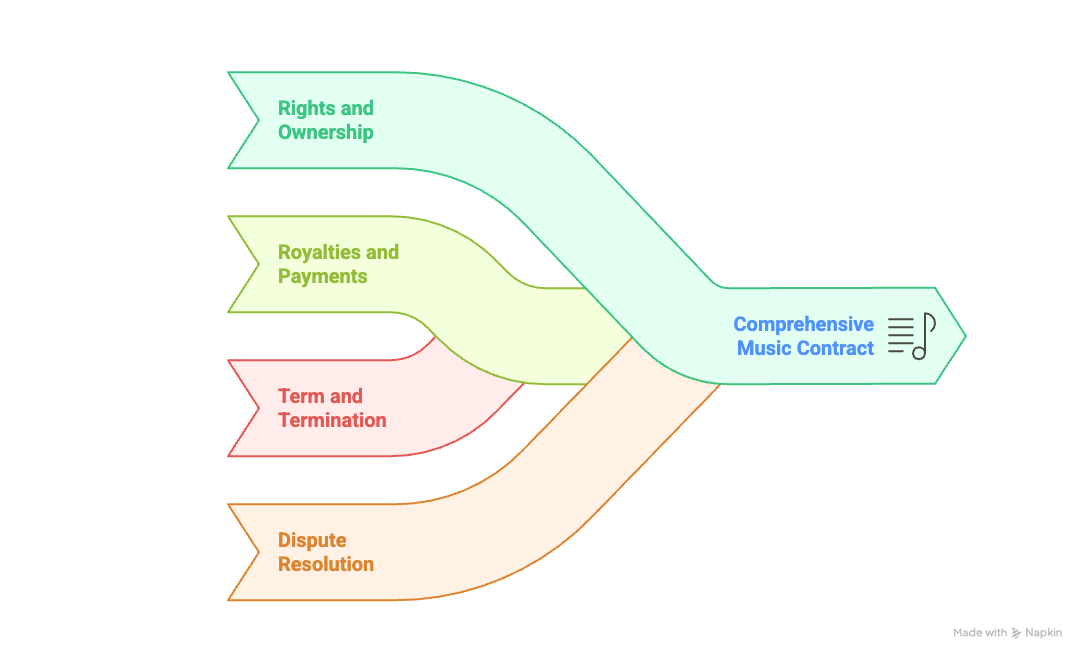
Computer Services Agreement For Small Businesses
Last Updated on May 10, 2025
Small businesses often rely on external IT providers for critical services such as software maintenance, network setup, or cybersecurity. Without a written agreement in place, these arrangements can lead to misaligned expectations, service gaps, or legal disputes. This guide explains why a computer services agreement is essential for small businesses, what it should include, how to tailor it for your needs, and how to get started with a free downloadable template.
Why Small Businesses Need a Computer Services Agreement
Unlike larger companies with in-house IT teams, small businesses often depend on freelancers or managed service providers (MSPs) for IT support. A computer services agreement ensures that every engagement—whether one-time or ongoing—has clearly defined terms. It helps you:
- Protect business data and customer information
- Avoid scope creep and unexpected costs
- Establish service levels and response times
- Resolve disputes with documented procedures
Without this agreement, your business could be exposed to data loss, service interruptions, or costly legal battles. It also shows clients, partners, or investors that your company takes IT governance and risk management seriously.
What to Include in a Small Business IT Services Contract
Scope of Services
Clearly describe what services are included. This might cover:
- Hardware or software installation
- Ongoing tech support or helpdesk services
- Cybersecurity audits or compliance consulting
- Cloud migration or network infrastructure
Payment Terms
Define how much you'll pay, when, and under what conditions. Include:
- Hourly rates or flat fees
- Invoicing schedules (e.g., monthly, upon milestone)
- Penalties for late payment or bounced invoices
- Accepted payment methods (e.g., bank transfer, credit card)
Data Security and Confidentiality
Include clauses that outline how your provider will:
- Handle sensitive business and customer data
- Secure access credentials and IT systems
- Report and remediate data breaches
Intellectual Property
Make sure your business retains ownership of any work product, including:
- Custom software or scripts
- Configuration documents or manuals
- Branding or system designs developed during the engagement
Termination and Renewal Terms
Set a clear contract term (e.g., 12 months) and define how it renews. Include exit clauses for:
- Termination for breach (e.g., missed deadlines or non-payment)
- Termination for convenience with notice (e.g., 30 days)
- Post-termination obligations like data return
Liability Limitations
Limit how much either party can be held responsible for. For example:
- Exclude indirect damages like lost profits or downtime
- Cap liability at the amount paid under the contract
- Define the provider’s responsibility for third-party tools or software
Service Levels and Response Times
Small businesses benefit from clear service level agreements (SLAs). These may include:
- Response time targets for support tickets
- Uptime commitments for hosting or infrastructure
- Maximum resolution windows for different issue types
Customizing the Agreement for Your Business Size and Industry
Not all small businesses are the same. If you're a small eCommerce business, you may prioritize system uptime, payment gateway stability, and PCI compliance. If you’re a professional services firm (e.g., accounting or law), you may require strict privacy clauses and control over remote access.
Here’s how to tailor your agreement:
- Retailers: Add clauses about point-of-sale system availability and seasonal support needs.
- Healthcare Providers: Include compliance with HIPAA or local equivalents.
- Startups: Consider IP ownership, scalability clauses, and early termination rights.
We recommend reviewing your agreement with a lawyer or legal advisor who understands your industry regulations.
Legal Compliance Considerations in Canada
For Canadian small businesses, your agreement should be aligned with:
- PIPEDA: For handling personal information
- Provincial contract law: Terms must be enforceable in your province
- CRA and tax regulations: Especially if services cross provincial or national borders
If you deal with customers in Europe or the US, consider data residency and international compliance clauses.
Download a Free Template
Want to get started fast? Download our free computer services agreement template specifically designed for small businesses. It's customizable, legally reviewed, and easy to adapt to any sector. You can edit it in Word, Google Docs, or export to PDF.
Download the Free Computer Services Agreement Template
Ready to apply what you've learned? Get instant access to the Computer Services Agreement PDF - free, editable, and built for Canadian businesses. No sign-up required.
Frequently Asked Questions
Answers to common questions about Computer Services Agreement For Small Businesses.
Do I really need a contract for small IT jobs?
Yes. Even small, one-off projects can lead to misunderstandings. A basic agreement protects your time and budget.
Can I reuse the same agreement for different providers?
Yes, just make sure to adjust the scope, payment terms, and dates for each engagement.
What if my provider doesn't meet the agreed service levels?
The agreement should include provisions for breach and remedies such as refunds or service credits.
Is this agreement legally valid in Canada?
Yes. Our downloadable template complies with Canadian contract laws and includes data protection clauses aligned with PIPEDA.
What should I do before signing?
Review the document thoroughly and ask the provider to explain any unclear clauses. You may also want a lawyer to review it if the contract value is high.
Can I sign and store it digitally?
Yes. Electronic signatures are legally valid in Canada. Store the signed version securely in your business records.
How often should I review or update the agreement?
At least once a year or whenever your service needs change significantly. Regular reviews ensure your contract reflects current risks and operations.
Explore More in Creative Digital Contracts
Discover curated templates in Creative Digital Contracts to help your business stay compliant and efficient.


